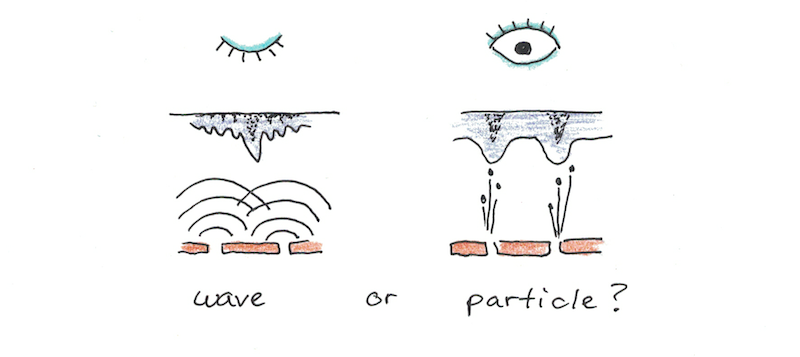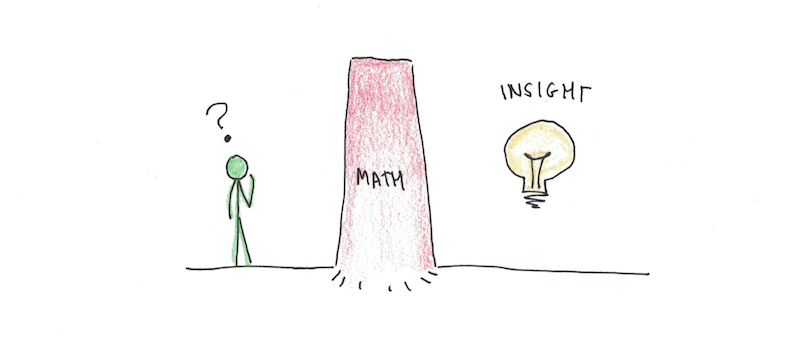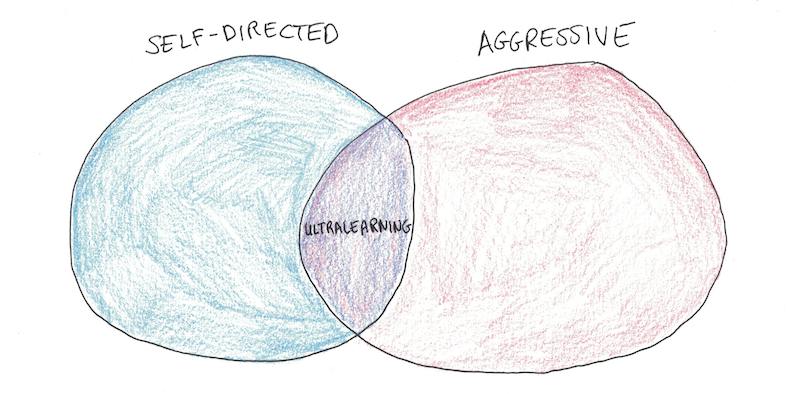A subject that has always confused and fascinated me was physics. When I was in high-school, I liked to read popular physics books like Brian Greene’s The Elegant Universe or Stephen Hawking’s A Brief History of Time.
The picture these books painted was a bizarre world. Space is a fabric. Time curves. Stuff is like a wave—except when we’re looking at where it goes, in which case it turns back into particles. The details are so strange they would be unbelievable as science fiction if they weren’t scientific fact.

Central to this bizarre world is quantum mechanics. These are the scientific tools that, although they seem to defy our intuition about how stuff ought to work, nonetheless offer an incredibly accurate picture of reality.
Can You Understand Quantum Mechanics Intuitively?
Quantum mechanics (QM) is famously a subject that’s been said to be impossible to grok. Even the famed physicist Richard Feynman casually remarked, “I think I can safely say that nobody understands quantum mechanics.”
This difficulty seems to be overstated. After all, thousands of physicists, engineers and chemists use QM brilliantly every day. Certainly that practical use doesn’t happen without understanding.
However, it does seem to be the case to me, as an outsider, that QM is very difficult to understand intuitively without knowing the math. Many of the key facts about QM seem unrelated in a casual explanation are simple logical consequences of the equations which govern QM.

Therefore, I feel like my earlier days of reading endless popular accounts of QM always lacked something important. Because there was no discussion of the math, or an attempt to wrap one’s head around it, QM always seemed hopelessly confusing for me.
Ultralearning Quantum Mechanics
Ultralearning is the practice of aggressively tackling a learning project of your own design and choosing. One of the more popular features of my blog has been my ultralearning projects taking on classes, languages and other skills.

Since QM is such a tantalizing and challenging subject, I wanted to see if I could chew off a piece of it in a self-education project. Fortunately, a gap appeared in my schedule that made me think April might be a good time to squeeze one in, so I thought I’d try to tackle my first attempts to get a good grounding in QM.
Let’s Learn Quantum Mechanics
My strategy for this project is similar to the one I used in the MIT Challenge. Take an open class from MIT’s OpenCourseware, try to learn as much as I can in a set period of time, and then take the final exam to see how well I learned the material.
In this case, I’m going to take MIT’s first QM class, 8.04 – Quantum Physics I. There are more classes after this one, so my month-long project isn’t going to close the book on this topic, but I’m hoping it will give me enough math so that my intuition about these things is on solid ground. In particular, understanding the basics of QM will also help me with understanding other subjects I’ve had an interest in such as quantum computing, biology and cosmology.
There’s two main changes I’m going to be making compared to my original approach I used during the MIT Challenge:
- I’m going at a more leisurely pace. At the peak, my pace was one class per week. I don’t think that’s possible for me with this challenge, both because I won’t be doing it full-time, and also because I expect the difficulty for this class to be higher than the MIT classes I did at that pace.
- I’m going to try to livestream the entire process. By doing the entire class live on camera, I’m hoping I can share my thought process behind tackling an ambitious learning goal like this one. While I’m sure most people aren’t going to want to watch me studying the whole thing, I hope recording the whole process will make it easier to give a reference example for some of the learning strategies I discuss on the blog.
Why This Will Be a Hard Class (And Why That Matters)
Quantum mechanics is difficult. However, in my case, that difficulty is doubly so for a few reasons:
- I haven’t done all the prerequiste classes. In particular, I’m missing 8.03 – Waves, which is a prerequiste in the series. This means there will almost certainly be some backtracking to learn concepts I’m missing (or need to relearn).
- The prerequisites I have done, I did almost eight years ago. There will undoubtedly be a lot of relearning and getting reacquainted with hard math problems and techniques I haven’t used since the MIT Challenge.
- Calculus-heavy classes were always a weak point for me. During the MIT Challenge, my best classes were those in computer science. My physics and electrical engineering classes, in contrast, were usually harder. This could be an intrinsic difficulty of those classes, but another reason is simply that my algebra/calculus problem solving skills aren’t as well-practiced as coding was for me.
I wanted to pick a class/topic that I would struggle with, because learning methods don’t matter so much when the subject is easy.
Therefore, I’m going into this class with some trepidation (especially live on camera), but I’m hoping that this experience will be a better example than if I can tackled a subject I had more confidence in.
How Can You Follow the Project?
My plan is to livestream up to six hours per day, five days per week, for a total of thirty hours per week. Tentatively, that’s going to be from 8am-11am and again at 2pm-5pm (Pacific Time), Mon-Fri.
Side note: Although I’ve managed to rearrange my commitments, I still have to work, run my business and keep up with life responsibilities on top of this. Therefore, the schedule may get shifted around if work preempts it.
If you’re interested in dropping in to see how it’s going, be sure to check out my YouTube channel here.
Of course, if you’d rather not watch the entire thing, I’m also going to try to post weekly highlights where I try to analyze how things are going and give some thoughts on tackling hard subjects like this.
If you do join the livestream, you’re welcome to chat with me (you can even learn along with me or help me out if you already know QM!). I’m not sure how chatty I’ll be at this point, because discussion may end up being a distraction. On the other hand, out-loud problem solving and reasoning are often good tools for building an understanding, so it may not matter so much.
One of my goals with this project is to see how doing a project livestreamed would work, so I’m sure there’s a lot of details I have yet to work out. If all goes well, I hope to do more projects like this in the future!

 I'm a Wall Street Journal bestselling author, podcast host, computer programmer and an avid reader. Since 2006, I've published weekly essays on this website to help people like you learn and think better. My work has been featured in The New York Times, BBC, TEDx, Pocket, Business Insider and more. I don't promise I have all the answers, just a place to start.
I'm a Wall Street Journal bestselling author, podcast host, computer programmer and an avid reader. Since 2006, I've published weekly essays on this website to help people like you learn and think better. My work has been featured in The New York Times, BBC, TEDx, Pocket, Business Insider and more. I don't promise I have all the answers, just a place to start.